Varicose Vein and Varicose Ulcer Laser Treatment in Navi Mumbai, Vashi
At SLVC Clinic, we specialize in advanced laser treatments for varicose veins and varicose ulcers, offering state-of-the-art care in Navi Mumbai, Vashi.
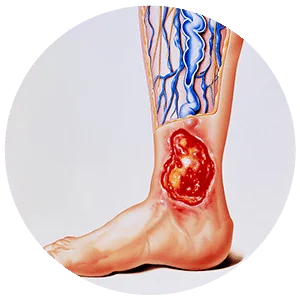
What exactly are varicose veins?
Varicose veins are enlarged, twisted veins that often appear blue or dark purple. They typically occur in the legs and are caused by damaged or weakened valves in the veins, leading to poor circulation and pooling of blood.
Stages of Varicose Veins
- Spider veins: You might notice small spider veins, which are tiny, thin veins close to the skin's surface.
- Visible Varicose Veins: Larger, twisted veins become visible, causing discomfort and aching.
- Edema (Swelling): Legs may swell due to increased pressure in the veins.
- Spider veins: You might notice small spider veins, which are tiny, thin veins close to the skin's surface.
- Bleeding: In severe cases, varicose veins can bleed.
- Ulcer Formation: Unhealed wounds or ulcers might develop around the ankles due to poor circulation.
How do you know if you’ve got varicose veins?
The most common Symptoms of Varicose Veins include:
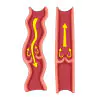
Visible, bulging veins
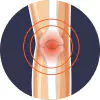
Painful, aching legs
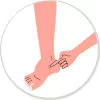
Swelling in the legs
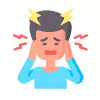
Restlessness
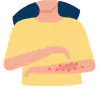
Skin ulcers

Fatigue
- If you are experiencing any of these signs or symptoms, it is important to see a doctor to get a diagnosis and discuss treatment options.
Who is at risk for varicose veins?
People who are at increased risk for varicose veins include:
- Women who are pregnant
- People with a family history of varicose veins
- People who are overweight or obese
- People who have had blood clots
- People who stand or sit for long periods of time
- People who smoke
How to treat varicose veins?
While varicose veins may not always be preventable, there are effective treatment options available:
- Lifestyle changes, such as losing weight, avoiding high heels, and wearing compression stockings
- Sclerotherapy, which involves injecting a solution into the varicose vein to cause it to shrink and disappear
- Laser ablation, which uses heat to damage the varicose vein
- Radiofrequency ablation, which uses radio waves to damage the varicose vein
- Surgery, which involves removing the varicose vein
Now, here's the thing- they're more than just a cosmetic issue.
Sure, they don’t look great, but sometimes, they can lead to other problems if left untreated. We’re talking about swelling, skin discoloration, or even ulcers and bleeding in severe cases.
But the good news? There are solutions.
Dr. Sagar Satpute, an expert endovascular specialist at SLVC Clinic in Navi Mumbai is here to help you bid farewell to those unwanted veins. With advanced treatments tailored just for you, we aim to alleviate discomfort, improve appearance, and prevent further complications.
Curious to learn more about the stages of varicose veins?
Watch a short video to understand better
Our Services
- Varicose Vein and Varicose Ulcer Laser Treatment
- Deep Vein Thrombosis (DVT) Treatment
- Peripheral Artery Disease Treatment
- Vascular Malformation Treatment and Sclerotherapy
- Gangrene/ blackening of toes
- Non-Healing Ulcer/ Non-healing wound
- Uterine Fibroid and Prostate Embolization
- Diagnostic Angiography
- Cancer Treatments: TACE, RFA, Embolization
Book An Appointment
Our Blogs
Ready to take the first step towards healthier legs?
Fill out the form below for a personalized consultation.
Frequently Asked Questions
Have Questions? Explore Our FAQs for Answers.
How are varicose veins diagnosed?
Varicose veins are typically diagnosed by a physical examination. In some cases, an ultrasound may be ordered to confirm the diagnosis and rule out other causes of vein problems.
What should I do if I have a slight varicose vein?
A small skin abscess may drain naturally, or simply shrink, dry up and disappear
without any treatment. However, larger abscesses may need to be treated with
antibiotics to clear the infection, and the pus may need to be drained
What are the treatments for varicose veins?
There are a number of treatments available for varicose veins, including:
- Lifestyle changes, such as losing weight, avoiding high heels, and wearing compression stockings
- Sclerotherapy, which involves injecting a solution into the varicose vein to cause it to shrink and disappear
- Laser ablation, which uses heat to damage the varicose vein.
- Radiofrequency ablation, which uses radio waves to damage the varicose vein.
- Surgery, which involves removing the varicose vein.
What are the complications of varicose veins?
The most common complications of varicose veins include:
- Skin ulcers
- Bleeding
- Infection
- Blood clots
Can varicose veins be prevented?
There is no guaranteed way to prevent varicose veins, but there are a number of things you can do to reduce your risk, including:
- Maintain a healthy weight
- Exercise regularly
- Wear compression stockings
- Avoid high heels
- Elevate your legs when you are sitting for long periods of time
- Avoid smoking
When should I see a doctor about varicose veins?
You should see a doctor if you are concerned about varicose veins, especially if you are experiencing any symptoms. Early diagnosis and treatment can help to prevent complications.
